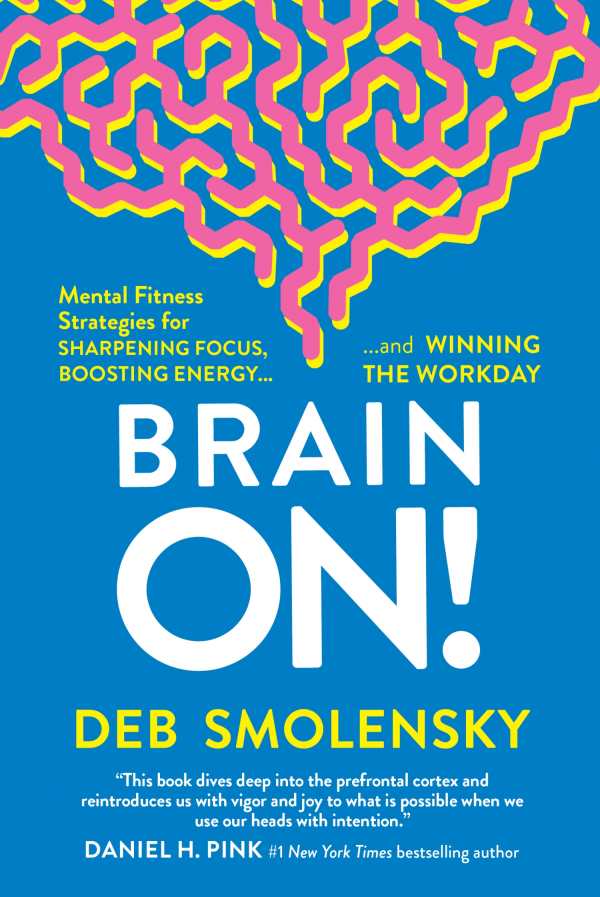Brain On!
Mental Fitness Strategies for Sharpening Focus, Boosting Energy, and Winning the Workday
Brain On! is an encouraging self-help text filled with methods for cultivating emotional intelligence in the office.
Deb Smolensky’s Brain On! is a self-help guide that emphasizes personal growth and individual mental wellness in the workplace.
“Knowledge workers,” or people who use their brains for a living, number about one billion in the total global workforce, says Smolensky. As a result, her book argues that mental wellness is a necessary consideration when it comes to navigating the thorny dealings of business and social relationships. In order to cultivate mental wellness, it suggests focusing on strategies to manage, monitor, and replenish workers’ energy throughout the day.
Indeed, the book asserts that workplace productivity efforts should focus on people’s strengths and mental wellness, not on tasks completed. If leaders adopt this mindset, it says, their decisions will cascade throughout their organizations in positive ways. The long-term effects of spiraling thoughts regarding vocational unworthiness, uncertainty, and personal bias are addressed alongside the positivity of curiosity, openness, and personal-growth mindsets.
The book is conversant with contemporary challenges too: the influences of biases under capitalism or for minorities are alluded to, if with focus placed on nurturing personal contributions rather than curing the failings of institutions. Smolensky advises employees to find meaning in their contributions with tangible methods of checking in with their emotions or by emulating human-first leadership. The importance of diversity, equity, inclusion, and belonging (DEIB) efforts and compensation and benefits are also named as vital aspects to worker satisfaction, engagement, and energy.
The book warns that distractions like computers and phones can switch the brain to an “offline” state, in which people are focused on primal emotions like fear and anxiety. It makes recommendations for enabling an “online” state, where the constructive functions of the prefrontal cortex are available. However, the discussions of internal triggers of “offline” mindsets prove much more developed than those of external ones.
The benefits of taking breaks throughout the workday are explained in detail as well. There are “Brain Check” sections to pose questions, check in with current moods and emotions, and offer a moment for a break. These checks embody the practice within the text. And still other portions of the book use color-coding and spacing in eye-catching ways to communicate their points. These tactics make their information easy to digest, as with the book’s long- and short-term goal-setting fill-in sections. When it comes to the book’s diagrams, though, the personified brain character “Onyx” is mentioned at the start and then sidelined, and the diagrams that do use Onyx are cluttered and wordy alongside the main text, impeding comprehension.
However, the book’s self-help and workplace concepts are intriguing and motivating. Smolensky denounces the toxic effects of online news and social media during workday breaks, encouraging workers to focus on mindfulness and relaxation instead, both of which foster productivity in turn. Ecotherapeutic exercises, physical exercise, self-compassion, and emotional openness are listed ways to ease the primal “offline” mode so that it is possible to access one’s higher self. Neuroscientific topics are addressed in accessible, concise language too. And on occasion, Smolensky inserts personal stories to communicate her concepts: she notes that when she came across a coyote in the forest, she tensed up in fear, even though it was apt to be just a big dog whose owner was hidden behind a tree. Similar false alarms occur with emails and other difficult conversations in the workplace, she notes.
Brain On! is an encouraging self-help text filled with methods for managing worker energy and cultivating emotional intelligence in the office.
Reviewed by
Ali Ortiz
Disclosure: This article is not an endorsement, but a review. The publisher of this book provided free copies of the book and paid a small fee to have their book reviewed by a professional reviewer. Foreword Reviews and Clarion Reviews make no guarantee that the publisher will receive a positive review. Foreword Magazine, Inc. is disclosing this in accordance with the Federal Trade Commission’s 16 CFR, Part 255.

